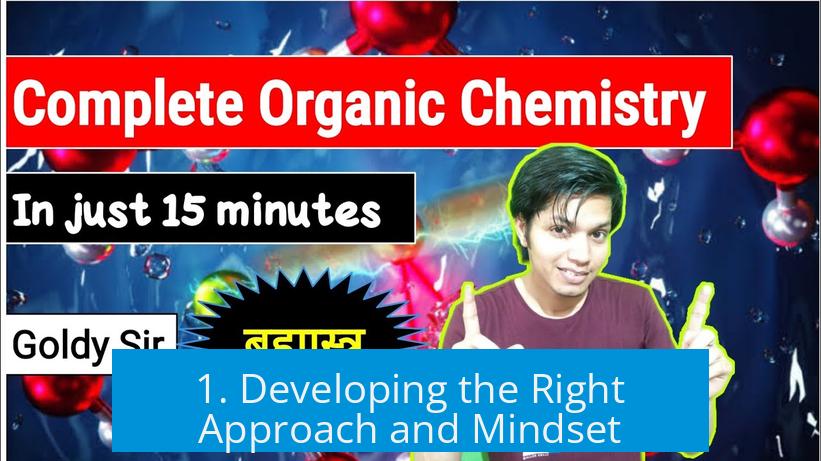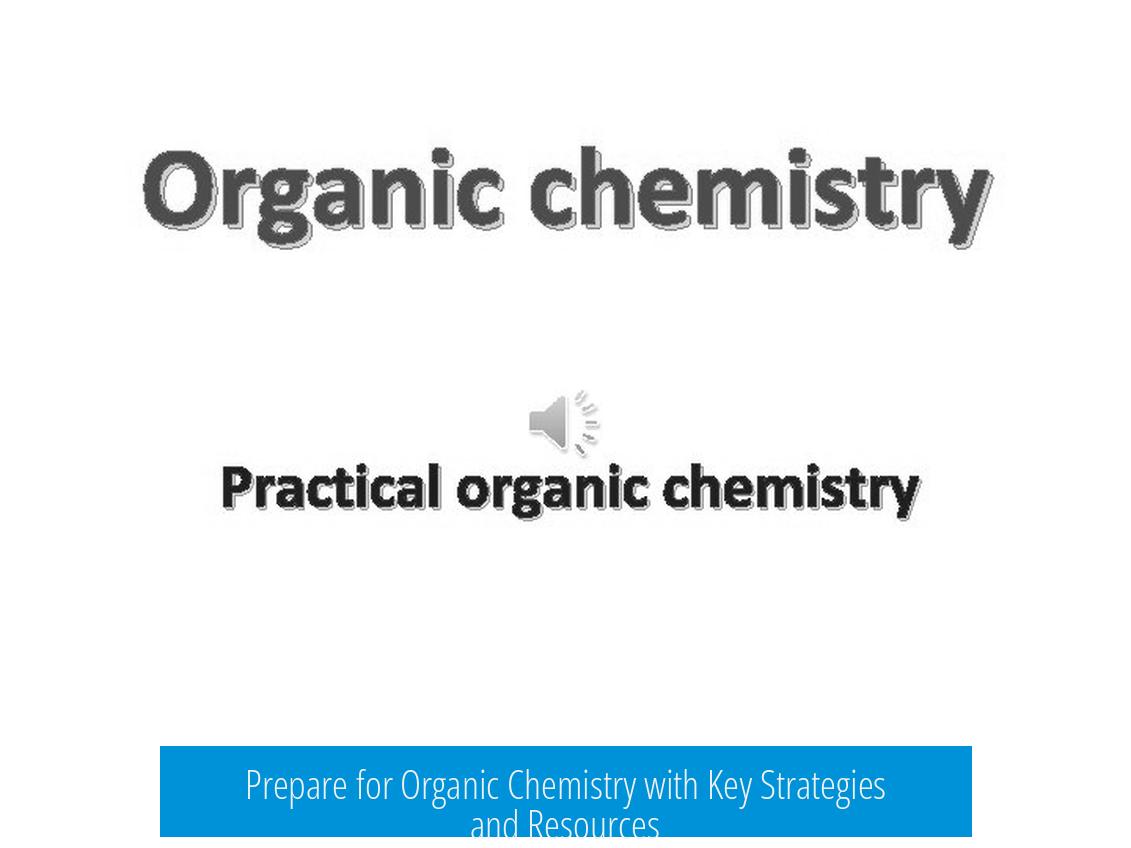How Can I Prepare for Organic Chemistry?
Preparing for organic chemistry requires adopting the right mindset, reviewing foundational chemistry concepts, focusing on core principles, using appropriate study resources, and developing effective study habits. Success depends on understanding patterns in reactions and continuous practice rather than rote memorization.
1. Developing the Right Approach and Mindset

The most critical step in preparing for organic chemistry is adopting an effective mindset. One must resist the urge to memorize every reaction. Instead, the focus should be on understanding broad principles that govern organic behavior.
- Think of organic chemistry as a puzzle involving logical patterns, rather than a subject to be memorized.
- Grasp how electrons move during reactions and identify roles of reagents and intermediates.
- Combine memorization of key reagents with logical problem-solving and pattern recognition.
- Stay adaptive—organic chemistry demands adjusting study strategies and staying current with material.
Conceptual understanding outweighs brute memorization. Recognizing nucleophiles and electrophiles enables predicting reaction outcomes. Regular engagement through reading, attending office hours, and active lecture participation supports solid comprehension.
2. Reviewing Essential General Chemistry Topics
Organic chemistry builds on several general chemistry principles. Refreshing these topics is vital:
| Topic | Key Points to Review |
|---|---|
| Bonding | Lewis structures, hybridization (sp, sp2, sp3), molecular geometry, bond angles, polarity, sigma and pi bonds |
| Acid-Base Concepts | Qualitative understanding of acidity and basicity, strong vs. weak acids, pKa and pKb values |
| Electron Configuration | Valence electrons in first two periods, orbital shapes, and electron arrangement |
| Periodic Trends | Atomic radius variations, electronegativity, and leaving group abilities as related to reaction mechanisms |
Understanding electron distributions and bonding types explains why molecules behave as they do. For instance, knowing how hybrid orbitals influence shape helps predict reactivity.
3. Focusing on Fundamental Principles and Recognizing Patterns
Organic chemistry relies heavily on core concepts that unify diverse reactions. Concentrate on these:
- Nucleophiles and Electrophiles: Identify electron-rich species (nucleophiles) and electron-poor species (electrophiles).
- Electron Flow: Follow the movement of electrons using curved-arrow notation to predict mechanisms.
- Reaction Families: Classify reactions into categories such as substitution, addition, elimination, and rearrangement to find common patterns.
- Conservation of Charge and Stability: Use concepts of intermediate stability and resonance to foresee reaction pathways.
About 95% of organic reactions conform to general principles involving nucleophile-electrophile interactions. Mastering these drastically simplifies problem-solving.
4. Utilizing Study Resources and Tools
Choosing the right materials enhances study efficiency. Recommended resources include:
- Textbooks: “Get Ready for Organic Chemistry” by Joel Karty and “Organic Chemistry as a Second Language” by David Klein provide clear explanations.
- Workbooks: “Pushing Electrons” helps build skills in reaction mechanisms.
- Online Videos: Khan Academy’s organic chemistry series offers concise visual tutorials.
- Cheat Sheets: Summaries of functional groups and reaction patterns aid quick revision (Example sheet).
- Blogs: Websites like Master Organic Chemistry provide in-depth guides bridging general chemistry and organic concepts (sample blog).
Supplemental materials help reinforce difficult concepts and provide alternate explanations to classroom lectures.
5. Adopting Effective Study Strategies and Habits
Success in organic chemistry demands consistent effort and study discipline:
- Practice Extensively: Regularly solve practice problems to integrate knowledge.
- Pre-Read Before Lectures: Review textbook sections prior to class for better comprehension.
- Participate Actively: Use lectures to clarify doubts and understand exceptions or lab applications.
- Take Good Notes: Summarize concepts and mechanisms carefully to aid later reviews.
- Utilize Lab Sessions: Labs illustrate practical applications of lecture content, deepening understanding.
- Avoid Cramming: Frequent, spaced learning is more effective than last-minute studying.
Organic chemistry cannot be mastered passively. Engage with the material regularly, and learn to think critically.
6. Mastering Specific Content Areas
Certain content areas require focused attention:
- Functional Groups and Nomenclature: Recognize common groups (alkanes, alkenes, alcohols, etc.) and prefixes (meth-, eth-, prop-).
- Reaction Mechanisms: Learn mechanisms through electron movement rather than memorizing each reaction by name.
- Spectral Interpretation: Understand basics of 1H NMR, 13C NMR, and mass spectrometry to characterize compounds.
- Named Reactions: Know only the essential named reactions required by the course.
Following electron flow and understanding how functional groups react enable deeper insight into organic chemistry.
7. Setting Realistic Expectations and Tips for Success
Organic chemistry differs qualitatively from general chemistry:
- The subject emphasizes concepts and patterns over numerical calculations.
- The workload is significant but manageable with proper study habits.
- Rushing or cramming typically leads to poor outcomes; steady progress is key.
- Preparing mentally for consistent work and stress management aids success.
Expectation management and a calm, persistent approach prevent anxiety and foster confidence.
Summary Checklist for Preparing for Organic Chemistry
- Refresh bonding concepts: Lewis structures, hybridization, molecular geometry.
- Understand acid-base qualitative ideas: pKa, acidity, and basicity.
- Review electron configuration and periodic trends.
- Learn the main principles governing most organic reactions.
- Identify and understand nucleophiles, electrophiles, and reaction patterns.
- Use recommended textbooks, videos, cheat sheets, and online resources.
- Study regularly with extensive problem-solving practice.
- Pre-read lecture material and engage actively in class discussions.
- Master functional group identification and organic nomenclature.
- Focus on electron flow to understand reaction mechanisms.
- Participate fully in laboratory practicals.
- Manage time, expectations, and study strategies to avoid cramming.
How should I balance memorization and understanding in Organic Chemistry?
Focus more on understanding core principles like electron movement. Memorize key reagents, but avoid trying to memorize all reactions. Combine both logic and memory for best results.
Which general chemistry concepts are crucial to review before starting Organic Chemistry?
Master bonding basics: Lewis structures, hybridization, and molecular shapes. Know qualitative acidity and basicity, electron configurations of light elements, and periodic trends like atomic radius.
What are the fundamental principles I should learn to excel in Organic Chemistry?
Understand nucleophiles and electrophiles. Learn to recognize reaction patterns and families. Use electron flow and stability concepts to predict outcomes in most reactions.
What study resources can help me prepare effectively for Organic Chemistry?
- Textbooks by Joel Karty and David Klein.
- Workbook “Pushing Electrons.”
- Khan Academy videos on organic chemistry.
- Cheat sheets for reaction patterns and functional groups.
What study habits improve success in Organic Chemistry?
Consistently practice problems and take thorough notes. Pre-read chapters before class. Ask questions during lecture. Use lab sessions to connect theory with practice.





Leave a Comment